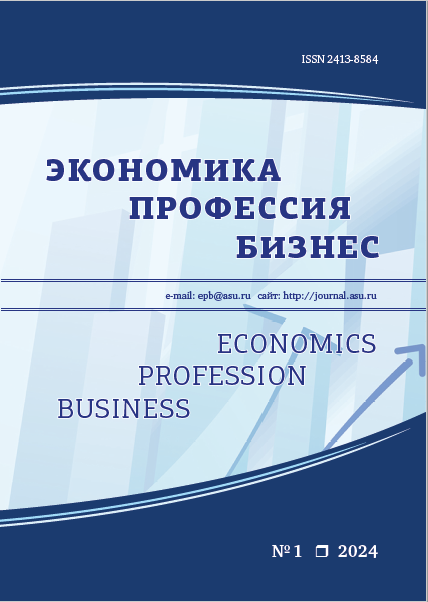INTEGRATION OF THE ALTAI KRAI AND THE SIBERIAN REGIONS ON COMMODITY MARKETS IN DIFFERENT PERIODS BETWEEN 2001 AND 2022: EXPERIENCE OF COMPARATIVE ANALYSIS. PART 1. 2001-2007
УДК 332.1 (571.1/.5)
Abstract
This article is а publication devoted to presenting the results of a study of trade and the Altai Krai's economic relations of with the regions of Russia in 1990-2022. The authors are the first to attempt to reveal the dynamics
of changes in the commodity markets of the region for more than twenty years, to assess the role and place of the Siberian regions as consumers of Altai products and suppliers of their products to the Altai market. At the same time, the assessment of the role of the Siberian regions was carried out in two ways: both their total role in the import (export) of products in comparison with other Russian federal districts, and each of the Siberian regions, taking into account their specialization.
A special place in the study was occupied by the analysis of the situation in the food market of the region due to its significance for the region.
Based on the results of the analysis, it was concluded that integration in the commodity markets of the Altai Krai and the Siberian regions as a whole is deeper compared to the other Russian regions. During the period under study, integration further deepened.
The Siberian regions play a significant role both in the consumption of Altai goods, primarily food, and, in particular, in saturating the commodity markets of the region.
The scale and nature of trade and economic relations between the Altai Krai and the Siberian regions are revealed in detail. Characteristic features were variability and inconstancy of the key characteristics of interregional trade and economic relations, coupled with their noticeable inertia, significant differences in trade relations with each of the Siberian regions.
Downloads
Metrics
References
Демьяненко А. Н. Российское экономическое пространство: диалектика процессов интеграции и дезинтеграции // Регионалистика. 2017. Т. 4. № 2. С. 5-10.
Кожевников С. А. Пространственная интеграция экономики: теоретические концепции и проблемы обеспечения на региональном уровне // ЭКО. 2022. № 3. С. 84-105.
Троцковский А. Я., Родионова Л. В. Методические аспекты исследования межрегиональных методических связей в Алтайском крае // Экономика Профессия Бизнес. 2023. № 1. С. 101-107.
Пилясов А. Н. Развитие региональной науки и выводы перед российским сообществом эконом-географов и региональных экономистов // Региональные исследования. № 7 (29). 2010. С. 16-41.
Троцковский А. Я., Наземцева Ю. Ю. Межрегиональный товарообмен Алтайского края в 19902020 гг. в контексте его социально-экономического развития // Экономика Профессия Бизнес. 2023. № 2. С. 119-132.
О межрегиональном обмене Алтайского края в 2003 году // Алтайский краевой комитет государственной статистики. Барнаул, 2004. 38 с.
Науменко Е. Н. О межрегиональном товарообмене и конкурентоспособности Алтайского края // Ползуновский вестник. 2006. № 4/1. С. 254-258.
Лукьянов А. Н. Роль государства в продвижении сельхозпродукции и продовольствия и формирование инфраструктуры их товародвижения // Вестник Алтайского государственного университета. 2012. Т. 93. № 7. С. 80-85.
Лукьянов А. Н. Меры по обеспечению конкурентоспособности производителей продовольствия на внешних товарных рынках (опыт Алтайского края) // Вестник Алтайского государственного аграрного университета. 2013. № 1 (99). С. 104-109.
REFERENCES
Demyanenko A. N. Russian economic space: dialectics of integration and disintegration processes. Regionalistics. 2017. Vol. 4. No. 2. Pp. 5-10.
Kozhevnikov S. A. Spatial integration of the economy: theoretical concepts and problems of provision at the regional level. ECO. 2022. No. 3. Pp. 84-105.
Trotskovsky A. Ya., Rodionova L. V. Methodological aspects of the study of interregional methodological connections in the Altai Territory. Economics Profession Business. 2023. No. 1. Pp. 101-107.
Pilyasov A. N. Development of regional science and conclusions for the Russian community of economic geographers and regional economists. Regional studies. No. 7 (29). 2010. Pp. 16-41.
Trotskovsky A. Ya., Nazemtseva Yu. Yu. Interregional trade exchange of the Altai Territory in 1990-2020. in the context of its socio-economic development. Economics Profession Business. 2023. No. 2. Pp. 119-132.
On the interregional exchange of the Altai Territory in 2003. Altai Regional Committee of State Statistics. Barnaul, 2004. 38 p.
Naumenko E. N. On interregional trade exchange and competitiveness of the Altai Territory. Polzunovsky Bulletin. 2006. № 4/1. Pp. 254-258.
Lukyanov A. N. The role of the state in the promotion of agricultural products and food and the formation of the infrastructure for their distribution. Bulletin of the Altai State University. 2012. Vol. 93. No. 7. Pp. 80-85.
Lukyanov A. N. Measures to ensure the competitiveness of food producers in external commodity markets (experience of the Altai Territory). Bulletin of the Altai State Agrarian University. 2013. No. 1 (99). Pp. 104-109.
Economics Profession Business is a golden publisher, as we allow self-archiving, but most importantly we are fully transparent about your rights.
Authors may present and discuss their findings ahead of publication: at biological or scientific conferences, on preprint servers, in public databases, and in blogs, wikis, tweets, and other informal communication channels.
Economics Profession Business (EPB) allows authors to deposit manuscripts (currently under review or those for intended submission to EPB) in non-commercial, pre-print servers such as ArXiv.
Authors who publish with this journal agree to the following terms:
- Authors retain copyright and grant the journal right of first publication with the work simultaneously licensed under a Creative Commons Attribution License that allows others to share the work with an acknowledgement of the work's authorship and initial publication in this journal.
- Authors are able to enter into separate, additional contractual arrangements for the non-exclusive distribution of the journal's published version of the work (e.g., post it to an institutional repository or publish it in a book), with an acknowledgement of its initial publication in this journal.
- Authors are permitted and encouraged to post their work online (e.g., in institutional repositories or on their website) prior to and during the submission process, as it can lead to productive exchanges, as well as earlier and greater citation of published work (See The Effect of Open Access).









